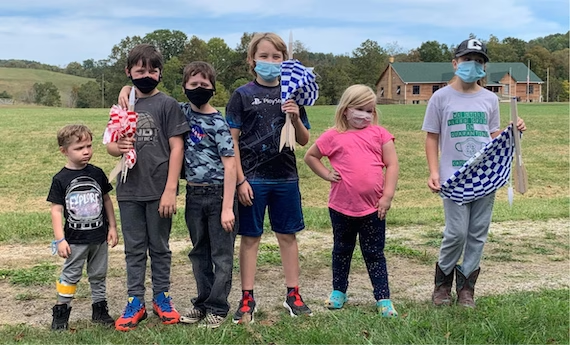Contact: Jack Bailey (304) 766-4109 jbaile19@wvstateu.edu
This fall, West Virginia State University (WVSU) 4-H partnered with its 1862 counterpart, West Virginia University (WVU) 4-H, to host Space Camp Family Fun Day. The event focused on Science, Technology, Engineering and Mathematics (STEM) and provided hands-on opportunities for young people.
“This collaboration was all about exposure,” said WVSU 4-H Extension Agent Alex Young. “If we can get kids exposed to STEM early, it is going to get them thinking about science and getting them more engaged long term.”
Activities included rocket building and launching, galaxy painting, constellations, phases of the moon and solar cars. Participants were able to design, construct and launch their own rockets.
The youth STEM collaboration with WVU 4-H began in January 2020 with a Space Camp Weekend that drew 30 campers from four counties. Using that template, 4-H educators wrote a grant to fund more space camp weekends.
“We plan to host two space camp weekend overnight events in March and April 2022,” said WVU 4-H Extension Agent Jocelyn Crawford. “WVU Extension Service 4-H is also working with WVSU’s Healthy Grandfamilies program to offer hands-on STEM kits and virtual lessons for kids and grandparents beginning in January 2022.” Healthy Grandfamilies is a statewide initiative that provides resources and education to grandparents raising their grandchildren.
Both WVSU and WVU Extension Services hope to expand partnerships in the future and offer more joint events and experiences for youth and families.
“The 4-H programs for both WVSU and WVU share the same focus on youth development and commitment to create community change related to STEM, healthy living, and civic engagement and leadership, but each program offers different kinds of opportunities and events for youth,” said Crawford. “By collaborating we are better able to spread the word about 4-H, and we can reach a wider pool of youth who are interested in the kinds of events we are hosting, like space camp.”
The project was made possible through the NASA West Virginia Space Grant Consortium, Grant # 80NSSC20M0055. The Consortium’s mission is to develop a statewide infrastructure that will enhance the state’s competitiveness in aerospace-related research, education and industrial activities. Specifically, the Consortium aims to capture, channel and enhance the interests and activities of current and potential scientists and engineers in its member institutions. One if its main goals is to enhance the interests and enthusiasm of K-12 students and teachers in STEM fields.
To learn more about the Consortium, visit .

West Virginia State University Teams with 1862 Institution for 4-H STEM Events
November 15, 2021